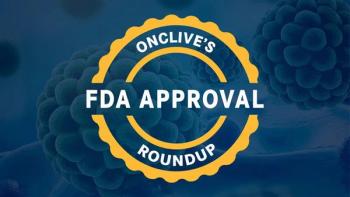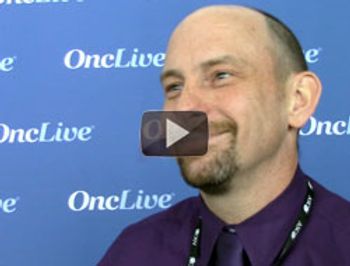
Here is your cheat sheet to all therapeutic options that were cleared by the FDA in November 2025 spanning tumor types.

Your AI-Trained Oncology Knowledge Connection!


Here is your cheat sheet to all therapeutic options that were cleared by the FDA in November 2025 spanning tumor types.

In an OncLive Peer Exchange, expert investigators convened to discuss the treatment landscape of early-stage NSCLC from a multidisciplinary perspective.

Jimmy Hwang, MD, discusses findings supporting the use of immunotherapy in hepatocellular carcinoma and biliary tract cancer, the potential benefits of antibody-drug conjugates in metastatic colorectal cancer, and unmet needs in esophageal squamous cell carcinoma and rectal cancer.

A team of researchers at Wake Forest School of Medicine, led by David R. Soto-Pantoja, PhD, has discovered blood biomarkers that can potentially predict response to immune checkpoint inhibitors in patients with melanoma.

Researchers from Wake Forest University School of Medicine have discovered a possible new approach in treating solid tumors through the creation of a novel nanoparticle.

Lowell L. Hart, MD, FACP, discusses the utility of antibody-drug conjugates in HER2-positive breast cancer.

While major accomplishments in blood and marrow transplantation (BMT) were being made around the country, the first BMT program at Wake Forest Baptist came into view, a vision brought to life by David D. Hurd, MD.

Active research and advancements in the field focuses on lessening the burden of radiation treatment while still maintaining acceptable cosmetic outcomes for patients with breast cancer.

The rise in survivorship has increased chronic pain in the cancer pain population, the treatment of which has many fundamental differences when compared to acute and terminal cancer pain.

The lack of comprehensive rehabilitation services is a profound source of unnecessary suffering for survivors.

Determination of BRCA1 and 2 mutation carrier status has become increasingly important. Estimates suggest that about 80% of breast cancers and 90% of ovarian cancers are sporadic; while only 5% to 10% of breast cancers are hereditary.


The prostate cancer team at the Comprehensive Cancer Center at Wake Forest Baptist Medical Center has recently focused on two primary areas: minimally invasive care and clinical research.

Timothy S. Pardee, MD, discusses the results of a phase I study of the mitochondrial metabolism inhibitor CPI-613 for relapsed or refractory acute myeloid leukemia (AML).

The incidence of oropharyngeal squamous cell carcinoma (OPSCC) has been steadily increasing over the last few decades, mostly due to HPV, which is now associated with the majority of newly diagnosed cases of OPSCC.

The pathologic analysis of lung cancer has become increasingly complex, calling for continued attention to improving the accuracy of the assessment and reducing the amount of tissue required.

The management of patients with malignant peritoneal surface disease (PSD) commonly known as "carcinomatosis" continues to evolve.

Men who experience hot flashes because they are undergoing androgen-deprivation therapy for prostate cancer are not significantly helped by two treatments that alleviate that symptom in menopausal women, the results of a study show.

To respond to the growing demand in cancer services that the existing cancer center was experiencing, Wake Forest Baptist Medical Center is expanding its comprehensive cancer center to help patients cope with the daunting challenges of cancer diagnosis and treatment.

The Malignant Melanoma Program at Wake Forest Baptist Health employs a multidisciplinary approach for the management of patients with all stages of this disease. The goals of the program are centered on unequivocal excellence in all areas of care for patients with malignant melanoma.

Bayard L. Powell, MD, from the Wake Forest Baptist Medical Center Comprehensive Cancer Center, discusses the treatment of older patients with acute myeloid leukemia (AML).

Glenn J. Lesser, MD, Professor, Hematology & Oncology, Comprehensive Cancer Center, Wake Forest Baptist Health, discusses armodafinil for brain radiation-induced fatigue.

Measurable patient characteristics that predict better tolerance have not been widely studied and are desperately needed in clinical practice to inform treatment decision-making and individualize care for each older adult with AML.

Bayard L. Powell, MD, the Director-At-Large and a Professor in Hematology & Oncology at the Wake Forest Baptist Medical Center Comprehensive Cancer Center, discusses the next steps for CPI-613 in hematologic malignancies.

Alterations in the chromosomes of two genes have been implicated in an increased risk of prostate cancer mortality, and the discovery holds promise for distinguishing which patients are candidates for more aggressive therapy.

Bayard L. Powell, MD, from the Wake Forest Baptist Medical Center Comprehensive Cancer Center, discusses a phase I study that explored the first-in-class mitochondrial metabolism inhibitor CPI-613 in patients with advanced hematologic malignancies.

Perry Shen, MD, FACS, and Clancy Clark, MD, from Wake Forest Baptist Health Comprehensive Cancer Center, discuss advances in the management of hepatic and pancreatic malignancies.